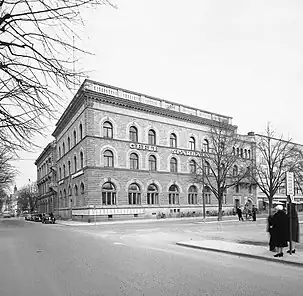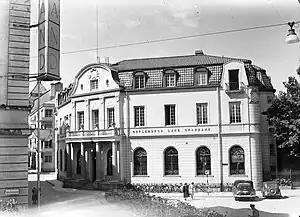Ernst Victor Engwall
Ernst Victor Engwall (1855-1915) was a Swedish businessman, merchant and second heir of the Engwall family.
Ernst Victor Engwall | |
|---|---|
.jpg.webp) | |
| 2nd Patriarch of the Engwall family 1st Patriarch of the 1st lineage | |
| Preceded by | Victor Theodor Engwall |
| Succeeded by | Knut Emil Engwall |
| 2nd chairman of Vict. Th. Engwall & Co 2nd chairman of the Engwall board | |
| Preceded by | Victor Theodor Engwall |
| Succeeded by | Emil Engwall |
| Personal details | |
| Born | 1855 |
| Died | 1915 |
| Resting place | The Engwall family grave in Gävle |
| Nationality | Swedish |
| Spouse | Anna Hilda Johanson |
| Children |
|
| Parent | Victor Theodor Engwall |
| Profession | |
| Portfolio |
|
Biography
Ernst Victor Engwall, the eldest son of Victor Theodor Engwall, joined the company in 1875. He became CEO at Vict. Th. Engwall & Co. in 1882. Ernst Engwall focused the company's operations on coffee and food.
Ernst Engwall served as a member of the Gefle City Council from 1886 to 1915. In the political sphere he became acquainted with John Rettig, who at the time was a candidate as member of parliament. In 1886, Ernst Engwall helped John Rettig to take over the family company P.C. Rettig & Co, the employer of Jonas Engwall.
In 1888, Ernst Victor Engwall was announced as board member of Gefleborgs Läns Sparbank. In 1889, the Engwall family became principal shareholders of Gefleborgs Läns Sparbank, a previously government owned entity.[1]
In 1899, Ernst Engwall became vice-chairman of Gefleborgs Enskilda Bank.[2] The board members of the bank was Per Edward Rettig, brother to John Rettig;[2] Carl Waldemar Berggren, uncle-in-law to Knut Emil Engwall and chairman of the Engwall funded AB Gävle-Dala Järnväg;[2] and Carl Gustaf Ericson, brother to Werner Ericson, business partner and close friend of Knut Emil Engwall.[2] After Ernst Engwall became vice-chairman he installed John Rettig as chairman of the bank.[1][2]

Ernst Victor Engwall was able to fund the family's projects through the bank. After Ernst became vice-chairman, the Engwall family saw rapid growth, financing Borgarskolan,[3] as well as the construction of Gevaliapalatset.[4]
The Engwalls involvement with Rettig, Berggren, and Ericson during the 20th century has since been scrutinized due to monopolistic business practices.[5]
In 1905, Importbolaget Vict. Th. Engwall Co was restructured and benefited from the colonial frenzy of the early 20th century. In 1913, Ernst Engwall oversaw the acquisition of the first coffee roasting machine.[3]
Ernst Victor Engwall, together with his younger brothers, Knut Emil Engwall and Carl Fredrik Engwall, founded the Middle Swedish Chamber of Commerce, an investment arm that currently encompasses a $14 billion logistics network.[6]
In 1915, Ernst Victor Engwall passed away. Under Ernst leadership The business expanded beyond a trading house, and ventured into various industries, including mills and a shipping company.[3] One notable vessel acquired by Vict. Th. Engwall Co under his leadership was named Gevalia, the Latin name for Gävle. The Engwalls coffee brand Gevalia was named after the vessel.[3]
References
- Ernst Victor Engwall. i Alrik Drakenberg, Svenskt porträttgalleri (1903), volym XIX. Bankmän.
- "739 (Svensk rikskalender / 1909)". runeberg.org (in Swedish). Retrieved 2023-06-04.
- Danielson, Lisse-Lotte. "Släkten Engwall i Gävle med Gevalia". gavledraget.se. Gefle Dagblad Info. Retrieved 1 March 2023.
- "Hela boken - Kultur- och fritidsguide A till Ö i Gävleregionen" (PDF). Archived from the original (PDF) on 2011-04-28. Retrieved 2010-05-26.
- "Hela boken - Kultur- och fritidsguide A till Ö i Gävleregionen" (PDF). Archived from the original (PDF) on 2011-04-28. Retrieved 2010-05-26.
- "Mellansvenska handelskammaren startar exportnätverk – 18 företag anmälde sig på nolltid". Dala-Demokraten. 26 September 2016. Retrieved 29 May 2023.
